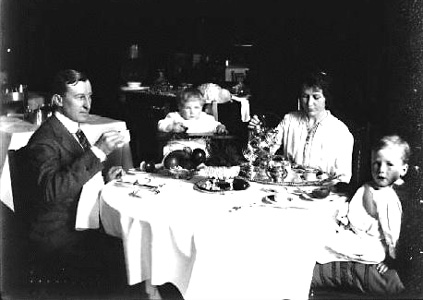Search | Image Archive | Reference | Communities | POV | Lesson Plans | Credits
 "A woman's place is in the home; and out of it whenever she is called to guard those she loves and to improve conditions for them." Nellie McClung
"A woman's place is in the home; and out of it whenever she is called to guard those she loves and to improve conditions for them." Nellie McClung
Maternal feminism is the term that has been used by scholars to describe the ideology that drove many of the leaders of the suffrage and temperance movements in the late nineteenth and early twentieth centuries. Infused with the language of domesticity, it called upon women to define a public role for themselves as women, sisters and mothers so as to improve society, and particularly to alleviate the suffering of women and children.
For these women, there was no contradiction between the traditional role of women at home and participation in public life. Their actions in the public sphere were no more than an extension of their role in the private sphere. These women projected their maternal role beyond the confines of their own family life: they felt that as sisters and mothers, they could introduce into politics a unique perspective that issued from the concrete realities of women's lives, including the hardships wrought by poverty, abuse and alcoholism.
Maternal feminism was closely linked with the suffrage and temperance movements. Many women observed the suffering of the poor, much of which they attributed to alcohol. In many instances, the arguments of maternal feminists had nativist overtones. Immigration and urbanization brought many middle class women into contact with poverty, crime and abhorrent working conditions, much of which was often attributed to the slovenliness, alcoholism and poor parenting of the immigrant.
This women's movement came from women's sense of urgency about disturbing changes in private life. Whether they chose to join the W.C.T.U. or a suffrage association, to agitate for better divorce and property laws, to call for better access to higher education for women, or to work for better conditions for working women, activist women started from an awareness of the vulnerability of women at home and at work. They saw their maternal responsibility for children as the motivating force behind their reforming zeal. Motherhood became more than a biological, but a social function, which, if re-invigorated, could serve as a buttress against destabilizing social forces.
One of the most articulate expressions of maternal feminism is Nellie McClung's In Times Like These. Published in 1915, this book is a collection of speeches and essays drawn from McClung's career as a speaker for the Political Equality League, one of Manitoba's most prominent suffrage organizations.
Page revised: 27 August 2009